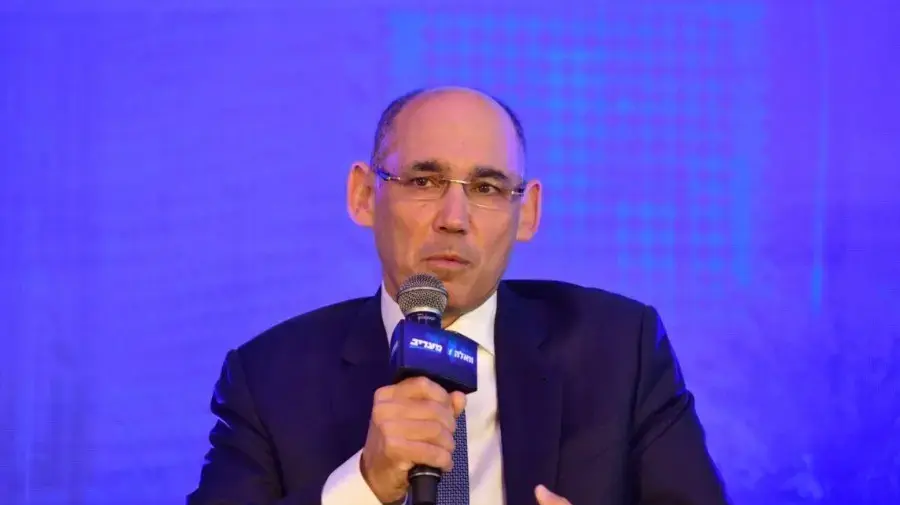This is what is being scaled down to the Israeli economy next year
2019 is coming to an end when the two major investment avenues in the capital markets in Israel and the world - stocks and bonds - have yielded impressive returns for investors. Looking ahead, Midroog is highly likely to be positive in the coming year as well
Stock exchange (Photo: shutterstock)
Capital market (Photo: ShutterStock)
Residential construction: an increase in the rate of housing sales and a rise in prices
The downturn in the pace of home sales, which began in 2016 as a result of “price per housing” tenders and intensified in subsequent years, has reversed in recent months. This is against the backdrop of government stagnation regarding the housing market affected by the ongoing election process and estimates that housing prices are not expected to decline.
Midroog estimates that by 2020, the upward trend in house sales will increase, and prices are expected to rise. The pace of sales will be favorably affected by the low level of mortgage interest rates and the internalization that government policy in recent years has not led to a fall in prices. "Accordingly, we expect residential development companies to show an increase in sales and benefit from their access to the capital market and other sources of funding."
More in Walla! NEWS More in Walla! NEWSEnergian will sell $ 1 billion natural gas to Oak Tabor Station over 15 years
To the full articleYielding Real Estate: Value increase is expected to continue
Against the backdrop of the dramatic fall in the government bond market, real estate companies in Israel in 2019 benefited from a delicacy that is reflected in a significant increase in the negotiable par value, which is a doubling of the previously unseen capital. Their access to the capital market is reflected in high demand for bonds raised at historically low interest rates and long foreclosures.
The value of real estate is also on the rise, with the asset discount rate steadily declining, mainly against the backdrop of low market interest rates and transactions that reflect a value higher than the face value in company books.
Midroog economists predict that "the trend of rising real estate value in Israel will continue in 2020, against the backdrop of significant recent deals in the market that reflect significantly lower discount rates than discount rates shown in the appraisals."
"The office market, especially in the center, enjoys high occupancy rates and fast population rates of new projects. This trend will continue to cause developers to increase the rate of development which will continue to be high in demand areas. Rents in high-positioned buildings and a central location are expected to continue upward, given the high prices in buildings. Our newcomers are expecting that, even in older buildings, rents will creep upward.
"As for commercial real estate, we believe that 2020 will continue to pose challenges in this industry. We will continue to witness the change in the mix of the centers, so that, on the commercial side, more will tend to the recreation and dining areas and, on the other hand, a tendency to mix the use of the complex. "
Midroog forecast for the domestic market
Midroog forecast for domestic market (Photo: Globes, PR)
Hotel: Growth will continue
Regarding the hotel industry, Midroog notes that 2019 is characterized by an increase in tourist arrivals to Israel compared to previous years. Accordingly, there is also an increase in the number of overnight stays in the tourist hotels, mainly due to foreign tourism. Despite the increase in room supply, room occupancy also shows a consistent increase over the years.
And what is expected next year? "In 2020, growth in this area will continue, and no security events will adversely affect incoming tourism. We also expect that a hotel-initiated process will continue throughout Israel in light of the demand and shortage of hotel rooms, which currently stands at just over 50,000 rooms. Therefore, in our estimation in the coming year, hotels in Eilat will suffer from the airport transfer from the city center to Ramon airport, which could negatively affect the level of occupancy and price level. "
Banks: Challenging environment, profit stability
The growth in the economy and the low unemployment rate supported banks' income and profits in 2019. "The business environment is expected to be challenging for the banking system in the coming year and will put some pressure on profitability rates, in our estimation. However, the banks have been able to build up enough cushions in recent years to cope with the rise in pressure," says Midroog.
Contrary to their outlook last year, Scrooge now assumes (much like most macroeconomists in the economy) that the interest rate environment will remain low in the short and medium term, with pressure to lower interest rates during 2020, with the inflationary environment remaining close to the lower target limit also due to structural changes. As a result, "pressure on the financial margin and the profitability of banks is expected, despite a significant component of cheap sources (current deposits). In addition, competition in several segments of the system is also increasing as a result of an increase in supply, both in the form of segregated credit card companies and of non-banking and finance companies (which will receive additional support for the launch of the open banking venture in 2020), along with continued competition with institutional bodies, also supporting pressure on The financial margin and the potential for growth in the credit portfolio. "
In line with these assumptions, by 2020, the banking credit portfolio is expected to grow at a rate of 3% -4.5%, with a focus on mortgage portfolios and medium and large businesses, which are currently at lower risk in relation to the consumer and small business sectors. This focus will also lead to some pressure on the credit spread. Overall, "banks are expected to maintain relatively stable profitability."
Midroog also anticipates that "the main competition generator in the long run will be innovation, with banks failing to adapt to the business model over time may experience significant erosion of the business profile."
Insurance: The low interest rate environment will continue to be burdensome
For the insurance sector, Midroog notes that the business environment, which was challenging this year, will continue to be challenging in 2020. "On the macro side, some slowdowns are expected in the pace of economic growth, with low interest rates and inflation rates continuing to accompany us at least in the near future. An extreme scenario, especially for insurers with significant life insurance and nursing portfolios, which weighs on profitability rates, regulatory capital adequacy and future yield potential, and, despite very positive capital markets in 2019, continued geopolitical tensions, trade wars, fears of a slowdown In global growth and instability Israeli political risk levels increase the capital market in light of the high prices. "
The low interest rate environment will continue to burden insurance companies also because of the difficulty of producing sufficient underwriting profits, increase the volatility of capital adequacy ratios, and encourage the adoption of technological innovation in certain segments.
"In the life insurance and long-term savings industry, we expect low profitability, which will continue to be significantly affected by exogenous factors, most notably the curve shifts and volatility in the capital markets in Israel and around the world. In the health insurance sector that has grown rapidly in recent years, we expect a certain moderation. In the auto industries, which will limit the low underwriting profitability in the first place. "
In the investment mix aspect, Midroog notes, we will continue to see increasing investments in non-marketable assets, primarily through increasing the share of credit and real estate, while continuing to divert funds from the domestic market to the international markets, in order to try to achieve surplus returns and diversify the investment portfolio. " Insurers who do not adopt technological innovation and do not fit the business model over time may experience significant erosion in business positioning. "
Food Retail: Competition will continue to moderate
This year, we witnessed a slowdown in competition in the industry relative to the past and this is expected to remain so in 2020. In the past year we have seen price increases while improving the gross profitability of food retailers. "In an environment of low real growth in terms of realities, as expressed by the same-store sales growth for most chains, food retailers are looking for growth sources in order to establish economies of scale. Therefore, we estimate that the retail space that characterized 2019 will continue into 2020."
Vehicle and Leasing: Increasing regulation, sales will continue to decline
Midroog estimates that in the coming years, the Israeli car market is expected to experience a regulatory increase that will put brakes on the car industry throughout, while weighing the tax burden on new vehicles and creating mechanisms for prioritizing public transportation, in the form of reducing public and cooperative transport routes, Gush Dan congestion and taxation Parking and private parking. These moves are inversely correlated with the level of income and therefore their impact on demand in the secondary market is higher compared to their impact in the new vehicle market.
New vehicle deliveries in Israel have completed a 12% drop in aggregate over the past three years, and Midroog economists estimate that this trend is expected to continue for 2020 as well. "In our estimation, the reason for the decline in demand for new vehicles is a real increase in vehicles, in light of the overall tax burden and The small vehicles in particular and the degree of saturation of demand due to congestion on Israeli roads, along with encouraging public and co-operative transport, which are expected to continue to hamper demand for vehicles over the coming years. "
With regard to the scale of penetration of electric vehicles in scaling, no significant penetration of electric vehicles is expected in 2020-2021 in view of high production costs as well as expected supply and demand constraints. However, "we estimate that electric vehicles are expected to capture a substantial share of between 23% and 40% of the turnover in Israel by 2025, which is higher than the government's target. Local tax policy will be a significant player in determining the demand and rate of penetration of electric vehicles into Israel."
Regarding the leasing industry, Midroog says that in recent years, the industry has experienced a realistic reduction in the total number of vehicles in Israel alongside the stabilization of demand in light of the use of value-added reform alongside continued natural growth in the local market. "We estimate the good results of leasing companies are expected to continue into 2020. The expected penetration of electric vehicles in the medium term is expected to pose a particular challenge to leasing companies given the expected pressure on the grid values of internal combustion vehicles. The leasing companies are able to deal reasonably well with the entry of electric vehicles into Israel. "
Communication: Challenges that never end
The telecom industry went through another tough year with a competition that is only getting stronger. The industry is expected to continue to be a challenging sector in the face of fierce competition across all segments, and in the background two significant challenges, including the transition of the stationary fiber optic Internet infrastructure and the upgrading of cellular infrastructure to the State of Israel's outline for the deployment of optical fiber in the State of Israel, eliminating the obligation of universality from Bezeq Company In low-economic areas, it is a first step in trying to bring the market back to balance, and in the scales, it is estimated that in light of the state of the industry, without significant structural changes, the telecom market will continue to suffer from imbalances between industry players in the short to medium term.
"Competition in cellular is expected to continue at full strength as the service sector continues to record average subscriber revenue with high abandonment rates. In our estimation, 2020 is expected to show similar price levels to the average of 2019. The deployment of the Generation 5 network is expected to impact on cellular companies in the medium term. These investments are expected to be added to the capital investments made by Cellcom and Partner companies in the deployment of optical fiber and the penetration costs of the multi-channel television market, and we believe that, given the above challenges, the need to strengthen the players' strength in the industry will be an engine for structural change in the form of mergers and acquisitions. Initiatives to stabilize the market seem less likely to us. "
More in Walla! NEWS More in Walla! NEWSHow can you get proper medical treatment without tearing your pocket?
In collaboration with Phoenix
To the full articleNatural gas: Increasing competition and surplus supply next year
In Midroog's estimation, the growth trend in natural gas demand that has characterized the Israeli economy in recent years is expected to continue in 2020 as well, supporting the regulation leading to the preference of natural gas over other fuels, as well as a continued increase in natural gas demand in the electricity sector.
"In light of the expected commercial operation of the Whale Reservoir in 2020, the volume of natural gas supply in the economy will be doubled, resulting in an annual production capacity of approximately 23 billion cubic meters (BCM), while in our estimation, the demand for natural gas will reach only 12 BCM. A significant surplus of supply is created in the domestic market, which will lead to the intensification of competition in the industry, whose buds could be seen in the prices of natural gas in the recently signed new contracts. "
Exports of natural gas to neighboring countries, Egypt and Jordan, are expected to moderate to a great extent and even regulate the level of competition in the industry. Midroog estimates that by 2020, total natural gas exports will reach about 4.5-3.5 BCM, and will mainly be affected by gas exports to Egypt. "Today, the volume of financial debt in the natural gas industry amounts to tens of billions of shekels, and we estimate that financing needs in the industry, including debt cycles, will range from $ 4.5-3.5 billion in 2020, with most of the debt raised to be used for the debt cycle used to develop the whale reservoir."







/cloudfront-eu-central-1.images.arcpublishing.com/prisa/IRPSFGXGNBF6XC6ZUTAXRV2FIU.jpg)







